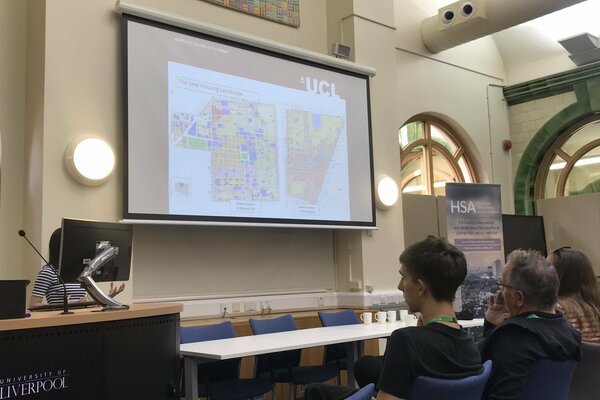Tom Moore is a Lecturer in Planning at the University of Liverpool. Alex Lord is a Professor in Planning at the University of Liverpool. In September 2019 they organised a housing research track, sponsored by the Housing Studies Association, at the annual UK & Ireland Planning Research Conference. In this blog, they reflect on their experience of the conference and provide an overview of the housing sessions.
This year’s Planning Research Conference (PRC) was hosted by the University of Liverpool, with 12 tracks coalescing around the themes of claims to legitimacy and pursuit of social, economic and environmental justice. One of these tracks focused on housing, with sponsorship from the Housing Studies Association supporting two sessions composed of eight papers.
While the track attracted a diversity of abstracts from all over the globe, the first session had a distinctly Anglicised flavour, as four presenters wrestled with issues of social and economic inequality and planning responses to these. Kat Salter (University of Birmingham) presented her research on the response of Local Planning Authorities’ to Neighbourhood Planning, identifying three responses – deflective, reactive and integrative – which impacted on the emergence of variegated forms and practices of localism. Janice Morphet and Ben Clifford (UCL) then offered a different perspective on the role of local authorities, reporting on research conducted for the Royal Town Planning Institute that has clearly identified a recent surge in local authority involvement in housing delivery though joint ventures, housing companies, and different forms of partnership. Quintin Bradley (Leeds Beckett University) offered a critical commentary on the five-year housing land supplies of local authorities, identifying a series of consequences related to increases in the length of time taken to build homes, incentivising housebuilders not to build, and pressure on local authorities to allocate more land than actually needed for housing. Malachy Buck (University of Liverpool) presented his ongoing research on residential, using Census data and Indices of Multiple Deprivation to explore movement in and out of more deprived parts of North Liverpool.
The second day of the housing track offered a range of international perspectives on different housing and planning issues. Monica Lopez Franco (UCL) presented on housing in historic centres of Mexican cities, using Guadalajara and Mexico City as case studies to identify market changes and tenant displacement from historic centres. Yixi Liao (UCL) presented her novel approach to understanding the London private rental market, combining Bourdieu’s social class theories and big data to explore different housing circumstances of renters of different social classes in London. Annika Hjelmskog (University to Manchester) brought things closer to home, discussing the role of housing associations in tackling health inequalities in Greater Manchester, identifying a two-tier system of access to health and social care between those in social housing and those in private rental housing unable to access similar support systems. Valeria Schneider (National University of the Northeast, Argentina) then concluded the session by presenting her plans to research effective planning processes in North Eastern Argentina, looking particularly at planning responses to informal settlements located in areas prone to flood risk.
While there are many similarities between the concerns of the two conferences, there is not always much overlap between the Housing Studies Association (HSA) conference and Planning Research Conference (PRC). This is surprising given the prevalence of housing scholars in planning schools around the UK and Ireland, as well as the fact that planning can often be central to both the cause and resolution of housing problems. Similarly, the PRC offers a supportive and friendly environment to that of the HSA conference, and runs a number of workshops targeted at PhD and early career researchers that may be beneficial to housing studies scholars seeking to reach a broader audience (e.g. paper writing workshops).
More information on this year’s Planning Research Conference can be found at: https://www.liverpool.ac.uk/geography-and-planning/events/planningresearchconference/. The organisers would like to reiterate their thanks to the Housing Studies Association for their sponsorship and support, and to the eight speakers in the housing track.
Tom Moore and Alex Lord
University of Liverpool







